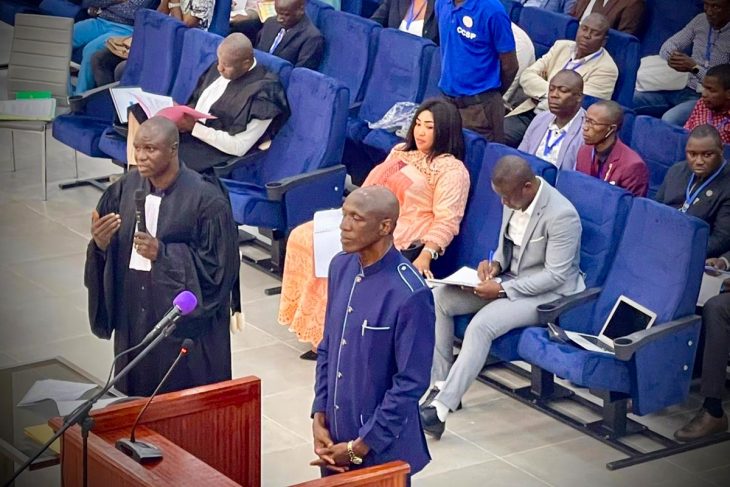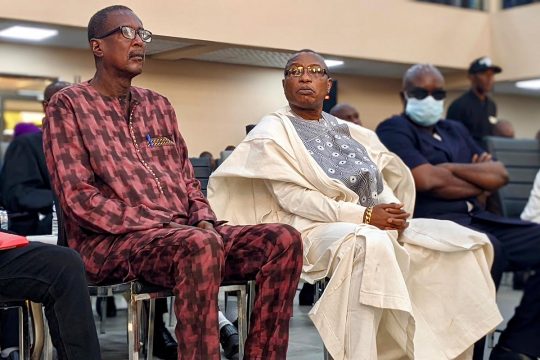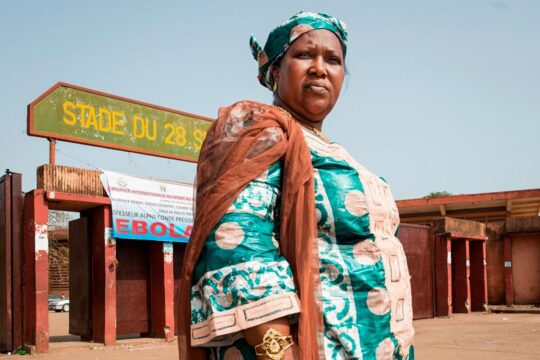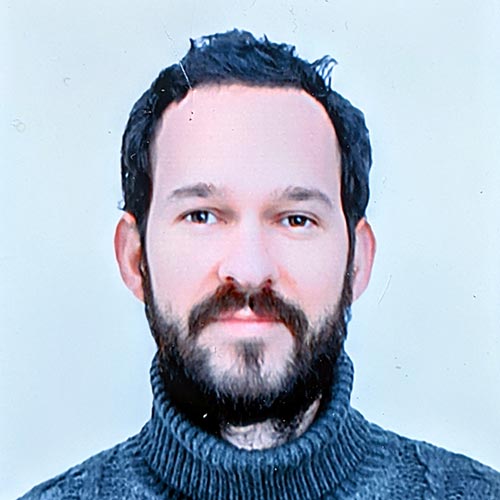The two soldiers are suspected along with nine other defendants of having participated in the September 28, 2009 massacre of 156 people during an opposition rally in the capital Conakry.
Moussa Tiégboro Camara, 53, was for many years, until last March, a key figure in Guinea's security apparatus, heading the powerful special services. At the time of the events, he was Secretary of State in charge of fighting drugs and organized crime. Charged with murder, assassination, rape, torture, kidnapping and sequestration, he was a heavyweight in the regime of former president Alpha Conde, overthrown by a putsch a year ago. He appeared on October 10, 11 and 12 before the court of Dixinn - part of the capital where the September 28 stadium is located – which has moved for the occasion to the Court of Appeal.
In the brand new building built for the Conakry stadium massacre trial, the seats are emptying as the debates continue. Only ten days after the symbolic opening of the trial on September 28, the audience is already sparse in the large courtroom. Security personnel in blue shirts and caps now occupy a quarter of the seats, where they doze during the hearings. They have been massively deployed in and around the court for this highly publicized trial, taking place under the cameras of Guinean television stations, is not open to everyone. Only people accredited by the Ministry of Justice can attend by passing three checkpoints. Each time, the security staff search bags and check access badges. These few dozen prison guards, police and military also ensure protection of the accused when they are brought into the box or transferred at the end of each hearing to Conakry central prison.
The week before, exchanges focused on procedural issues. All requests were rejected and all defendants remain in custody. Former junta leader Moussa Dadis Camara will not receive special treatment or be allowed house arrest, nor will Aboubakar Toumba Diakité, whose lawyers requested medical evacuation. These technical discussions have wearied some victims, who are now less likely to attend the hearings. Others live far away and cannot come every day. It is also "a question of security", confided Alpha Amadou DS Bah, lawyer for the civil parties. And since the trial is being broadcast on the Internet, "we did not think it was necessary to expose these people, as they risked being identified and then subjected to attempts at intimidation”.
Tiégboro steps forward in a Borsalino
Tiégboro was the first to be called to the stand by the court president. The former head of the anti-drug unit stepped forward wearing a Borsalino and then placed his hat on his lawyer's table. His gangly figure stood facing the president and he remained standing throughout questioning.
He pleaded not guilty, denied having participated in the massacre, and explained that he had gone to the stadium on September 28, 2009, to fulfil his “duty as a soldier”. When he learned that gunfire was erupting at the site of the opposition meeting, he decided to go there without having received orders. He said he found the political leaders Cellou Dalein Diallo, Sidya Touré and Jean-Marie Doré, who had been hurt during the repression of the demonstration. It was he who took them to a clinic in Conakry to receive first aid, he said. "I did not go inside the stadium. I knew that Toumba and his men were there. You know my relationship with Toumba."
Aboubakar Sidiki Diakité, known as "Toumba," is the former aide-de-camp to Moussa Dadis Camara, Guinea's self-proclaimed former head of state -- two other heavyweights in the trial. Tiégboro said that because of his conflicting relations with Toumba, he chose to remain on the stadium esplanade where he saw "no corpses, no rape”. Under a barrage of questions, Tiégboro remained unperturbed but exploded when one of the civil parties’ lawyers asked: "Mr. Camara, aren't you lying?” The room was in turmoil. The president’s voice had trouble breaking through the hubbub. The hearing was adjourned.
Tiégboro was less tempestuous faced with the prosecutors. "Didn't you see the women running around half-naked, their clothes in tatters? There are videos of them. They were filmed on the esplanade of the stadium," said the prosecutor. First to appear, the gendarmerie colonel used his position to develop his version of the facts. When a lawyer for the civil parties cited witnesses who claimed to have seen him on the stadium grounds, Tiégboro said: "Confront me with these people, bring the proof!”
In Guinea, "we hear the accused first”
Why did the judges decide to start with Tiégboro? “It’s the cornerstone of this case, it’s quite strategic to start with him," said Bah, lawyer for the civil parties. In the Guinean judicial system, "we hear the accused first, and it's after their interrogation that the witnesses and victims are heard", he explains.
The contrast was great when the second defendant, Marcel Guilavogui, was invited to take the stand in the afternoon of Wednesday, October 12. He is 45 years old, thirteen of which he has spent in Conakry's central prison. "My client is ill, can he sit down Mr. President?" his lawyer asked. A chair was placed for him.
- "On September 28, 2009, what position did you hold?
- A good question, Mr. President. You know it has always been said that I was Toumba's deputy. I was never appointed [to this position] by the President of the Republic Moussa Dadis Camara.
- What was your function?
- I was President Camara’s bodyguard."
For half an hour, the man gave an account of his long detention since April 1, 2010, initially for "inciting rebellion" and then for his alleged participation in the September 28 massacre. "My children grew up without me and I could not educate them!” he told the court.
On the day of the massacre, he said, he was in his bed, having been the victim - the day before - of a road accident. "I almost lost my tongue [in that accident]. I was instructed not to make any movements for at least one to two weeks." Yet, the prosecutor said, witnesses saw him "shooting at the crowd in the stadium".
Guilavogui became angry, raising his voice on the stand. "Calm down and answer the questions," the court president told him. The prosecutor continued: "Did you learn that there was looting in the suburbs on the same day and the following days?" Guilavogui said no. The prosecutor asked if he remembered his interrogation on November 3, 2010 when he told investigators otherwise. Guilavogui hesitated on his answer, said he had fallen ill in the meantime and lost his memory. "So you are not sure of what you said? In fact, you remember what happened when it exonerates you," said the prosecutor.
Guilavogui's appearance is scheduled to continue on Monday, October 17.
The first defendant’s testimony lasted three days. The interventions of the lawyers for the civil parties, some 20 in all, were often repetitive. After Guilavogui, there will be nine defendants to listen to, and a hundred witnesses and victims. The court has also decided to limit itself to three days of hearings per week, from Monday to Wednesday, to allow the lawyers to continue with other cases. A recess is also a possibility. "Lawyers could ask for additional information so that they can investigate certain parts of the case, particularly the mass graves. There has not yet been any investigation into these elements," said DS Bah.
At this rate, the trial -- whose schedule has not been announced -- will last several months and perhaps "a year", according to government spokesman Ousmane Goual Diallo.








